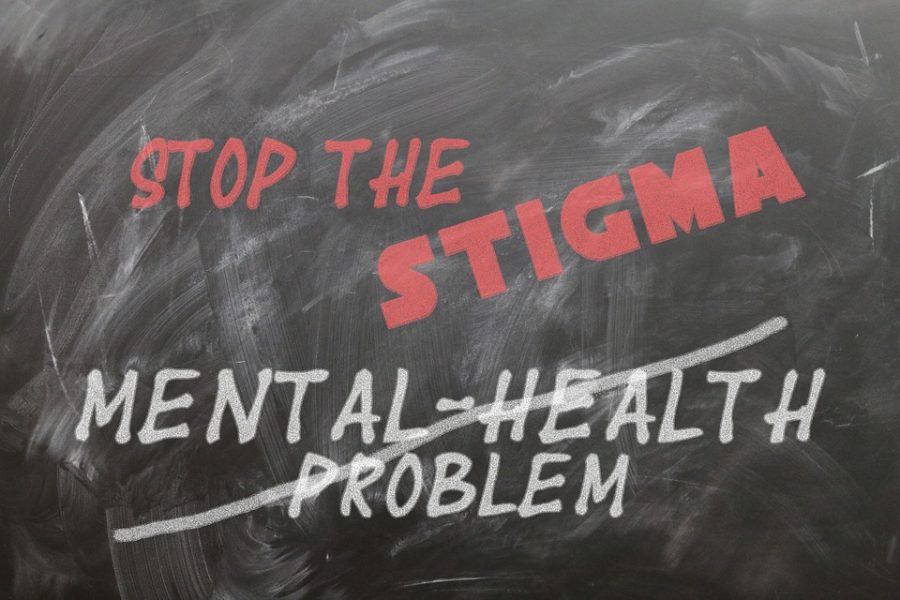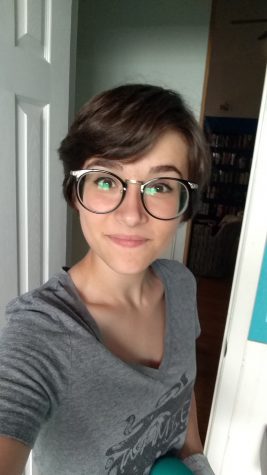Mental Health Awareness Month: Down the Rabbit Hole
May 12, 2016
This story has a trigger warning for mention of depression, self harm, and eating disorders. If any of this material may distress you, please read with caution.
I was 14 when I was first diagnosed with clinical depression. The signs had been there for years, but my mother finally broke down when she caught me in the kitchen crying with a paring knife in my hand, my arm laced with blood. This isn’t an uncommon occurrence these days either; mental illness has been gaining more attention yearly as more and more people come out with their stories, yet there is still a stigma towards those suffering with different forms of mental illness.
The first time I cut was in September of my fifth grade year. I don’t know why I thought it was worth a try at the time. I barely knew anything about it at all, just that it helped some people. I had been through another day of being bullied by my so called “best friend” at my school, and thought that I needed a way out. It hurt more than I expected, but I found an odd beauty in the red lines that would spread across my skin like spiderwebs.
Later that year, someone told me I was fat. I hadn’t thought about my looks as too important up until then, but for some reason it hit me and I decided I needed to change. I tried dieting, but that didn’t seem to be making change fast enough. I began to limit how much I ate. Maybe I’ll skip out on snack today, or lunch. I went from having three meals a day with a snack, to having maybe one meal.
Five years later, during my second year of high school here at Westwood, I found my mom’s razor blades. She had them for her sewing projects, but on a whim I pocketed them. Later that night, after a particularly rough day at school, I pulled them out and was surprised at how easily I found myself falling back into a familiar pattern with self harm. It was the first time I had cut since the seventh grade.
I didn’t stop.
Later that year, I was admitted to Shoal Creek, the local mental institution run by Seton Family of Hospitals, for self harm and attempted suicide. After five days in the looney bin, I was behind on schoolwork. I struggled getting back into the swing of school, finding that I had become distanced from most of my friends. I felt alone, so I didn’t get better.
Second semester of sophomore year, I left Westwood and tried homeschooling. It didn’t help, and without a schedule I retreated further and further into myself, staying up all night and sleeping until three in the afternoon almost everyday. I rarely ate, never saw my friends, and fell further and further down the rabbit hole, just trying to desperately get my medications to balance out and work properly for once.
Eventually, they did. During the first semester of my junior year, I managed to get it together and finished all of my work just in time to come back for the second semester of this year. I was nervous, but I knew I had to get out of online schooling.
My first day was scary, but I reconnected with friends, even made some new ones. I fell in love, then lost it all, worked to keep my grades up, went to tutoring, took tests, went out late with friends. I finally felt normal again. I was amazed that for once in my life, even when everything seemed to fall apart, I was able to pick myself back up again. I wasn’t starving myself so I could look like some stick from a magazine, I threw away my razor blades, my parents didn’t have to lock up the medicine closet anymore.
I’m not writing all of this just to make it seem like my life is suddenly great now. I’m not writing this to tell anyone who is suffering depression that their life will magically get better, because it takes time to figure what’s going on and how to fix it. I worked on balancing my anti-depressants for over four years before they worked. I tried medicine after medicine, dealing with severe side effect after side effect. I tried acupuncture, tea, vitamins, everything. I ended up with tardive dyskinesia, a disorder that causes my eyes to uncontrollably flicker upward, a disorder that is referenced as similar to minor epilepsy by some doctors. Eventually, it paid off, and for now I seem to have found the right balance of chemicals. I’m writing this to tell a story, my story, and my story isn’t over yet. Yours isn’t either.
The news is full of tragic stories that could have been prevented with better mental health care. The stigma and shame people feel over mental health issues keep them from seeking the care they need. No one expects a person with cancer to “suck it up,” but that is often the message that people get when suffering from anxiety, depression, or other mental conditions. The discussion about mental health is one that our country, and the world, needs to have. Now is the time for helping people instead of shaming them and telling them someone else has it worse. It’s the time for encouraging our peers instead of putting them down for reaching out and asking for help. It’s the time for solving mental illness instead of hiding from it, ignoring it, and hoping it just goes away. It won’t.
If you or someone you love is suffering from mental illness or thoughts of suicide, you can call the National Suicide Hotline at 1-(800)-273-8255 or go to their website at www.suicidepreventionlifeline.org.




Karen Austin • Sep 5, 2016 at 12:04 am
Thank you, Simone Heim, for sharing this account with us. I believe that this a crucial piece of information in this newsletter, as it is one that may give hope to students combatting mental illnesses such as depression and may prevent incidences of suicide, the third-most common cause of death in adolescents and second-most common cause of death college-age. Thank you for giving a true example of how mental illness often responds positively to treatment.
As you indicated, depression is a war, and victories almost always require teamwork. No one should be expect themselves or others to fight mental illness by themselves.
Your paragraph encouraging discussion about mental illness and support from peers is wonderful and true advice. It is key for people experiencing symptoms of depression in themselves or in their friends to seek help.
People who suspect symptoms of mental illness should never assume that parents are aware of the illnesses, especially as teens often hide their thoughts and many naturally seek independence from their parents. Hours spent with family are often limited by school, student activities, work, and other responsibilities. Parents are often blinded by their hopes, dreams, pride, and love for their children, sometimes convincing themselves that nothing is wrong even when they see problems. If concerned about themselves or their friends, students should tell trusted adults such as parents, teachers, and counselors about their concerns so they can help seek out medical attention for the person with mental illness.
I recommend downloading one of several free apps found by searching for “suicide prevention” to use for reference regarding symptoms of depression and how to respond if you see symptoms in a friend.